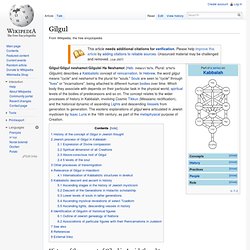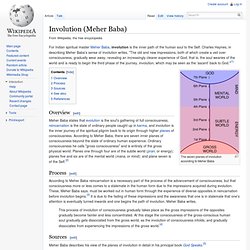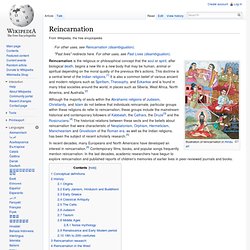

Gilgul. Gilgul/Gilgul neshamot/Gilgulei Ha Neshamot (Heb.

גלגול הנשמות, Plural: גלגולים Gilgulim) describes a Kabbalistic concept of reincarnation. In Hebrew, the word gilgul means "cycle" and neshamot is the plural for "souls. " Involution (Meher Baba) For Indian spiritual master Meher Baba, involution is the inner path of the human soul to the Self.

Charles Haynes, in describing Meher Baba's sense of involution writes, "The old and new impressions, both of which create a veil over consciousness, gradually wear away, revealing an increasingly clearer experience of God; that is, the soul wearies of the world and is ready to begin the third phase of the journey, involution, which may be seen as the 'ascent' back to God. Reincarnation. Reincarnation is the religious or philosophical concept that the soul or spirit, after biological death, begins a new life in a new body that may be human, animal or spiritual depending on the moral quality of the previous life's actions.

This doctrine is a central tenet of the Indian religions.[1] It is also a common belief of various ancient and modern religions such as Spiritism, Theosophy, and Eckankar and is found in many tribal societies around the world, in places such as Siberia, West Africa, North America, and Australia.[2] In recent decades, many Europeans and North Americans have developed an interest in reincarnation.[6] Contemporary films, books, and popular songs frequently mention reincarnation. In the last decades, academic researchers have begun to explore reincarnation and published reports of children's memories of earlier lives in peer-reviewed journals and books.
Conceptual definitions[edit] Bodhisattva.